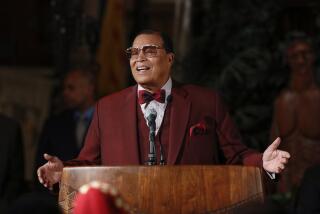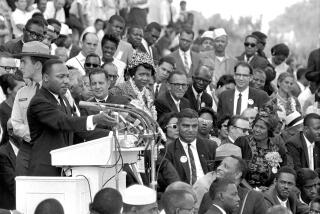2 African American Islamic Leaders Vow to Join Forces
- Share via
Islam’s two preeminent African American leaders, separated by two decades of rivalry before reconciling two years ago, reaffirmed unity Friday in their first joint appearance in Los Angeles.
Nation of Islam leader Louis Farrakhan and W.D. Muhammad of the Muslim American Society offered stark contrasts--one a fiery orator of political polemics and black empowerment; the other a low-key leader who resolutely sticks to religion. Once united under Nation of Islam founder Elijah Muhammad, they split 25 years ago over doctrine, with W.D. Muhammad rejecting his father’s blend of Islam and black nationalism and moving into orthodox Sunni Islam.
For the record:
12:00 a.m. Feb. 22, 2002 FOR THE RECORD
Los Angeles Times Friday February 22, 2002 Home Edition Main News Part A Page 2 A2 Desk 1 inches; 31 words Type of Material: Correction
Muslim leader--A story in the California section on Saturday about unity efforts by two African American Muslim leaders incorrectly spelled one of their names as Imam W.D. Muhammad. The correct spelling is Mohammed.
The two men, who together command the nation’s single largest group of Muslims--African Americans--vowed Friday to join forces to build up the black community. Creating an Islamic movement in pluralistic America could be a global model, they said as they kicked off the Nation of Islam’s Saviour’s Day convention.
“We are going to stick with Minister Farrakhan all the way to the promised land,” said Muhammad as he led Friday prayer before thousands of Muslims at the Los Angeles Convention Center.
For Farrakhan, 69, the appearance with Muhammad reinforced the conciliatory theme he has struck all week: Wednesday and Thursday, he urged peace among gang members in Watts, exhorted hip-hop artists to sanitize their lyrics and performed a Beethoven violin concerto in his second public performance in 42 years. The convention offered several workshops pegged to the theme of healing and reconciliation--such as one on religion that featured panelists of Jewish, Christian, Sikh and both Sunni and Shia Islamic backgrounds.
Farrakhan set the stage for the conciliatory events with the violin concerto Wednesday, which he said he offered to the public because music “is a universal language ... with the power to bind.” He likened the orchestra--disparate elements brought together in harmony for a common musical aim--to the vision he promotes of bridging racial and religious divides.
Some critics are skeptical that a man long regarded as a race-baiter and Jew-hater is sincere in his reconciliation efforts. But among those vouching for him was his Chicago violin teacher, Elaine Skorodin Fohrman--a Jew whom Farrakhan said he chose in part to prove his goodwill toward the Jewish people. Fohrman, who performed with Farrakhan at his concerto in Cerritos, says she decided to teach him despite his controversial statements about Jews because of his passion for music and his love of Jewish composers.
“The love of music is what I saw with great passion,” Fohrman said. “I knew certainly he could not have hatred in his heart.” She said she saw a correlation between Farrakhan’s decision to return to the violin a decade ago and a softening of his persona and message.
Farrakhan himself told reporters this week that the Nation of Islam was evolving, just as a thorn-scarred rose grows into “a beautiful flower.” He said all major religious movements have started out narrowly and broadened their reach into a universal message, and that the Nation of Islam was doing the same.
Indeed, in recent months Farrakhan has begun moving into the universal message of orthodox Islam. He has been aided by Muhammad, whose followers have helped train Nation of Islam forces in orthodox practices.
But major theological differences remain. Just as evangelical Christians view Mormons and Jehovah’s Witnesses as deviations from their faith, orthodox Muslims reject the Nation’s core beliefs that Elijah Muhammad was a divine messenger and that his teacher, W. Fard Muhammad, was God incarnate. Orthodox Muslims reject the idea of human divinity and believe the prophet Muhammad was God’s final messenger.
The differences have inhibited some orthodox Muslim groups from supporting Farrakhan, financially and otherwise. But Farrakhan seemed to hint Friday that he would begin moving his flocks away from those ideas.
Whether his followers can embrace the changes remains to be seen. “Master Fard was God in the person,” insisted Alfonso Muhammad, 37, a Nation of Islam minister in Los Angeles.
In an interview, Muhammad asserted that Farrakhan did not actually believe the old Nation doctrines anymore--”He’s no fool”--but was moving carefully so as not to lose his following. Now that Farrakhan is leaving behind his controversial religious and racial doctrines, Muhammad said, he is headed toward the status of Malcolm X as one of the black community’s leading consciences.
Muhammad said the two movements will probably never merge, however. Farrakhan is “a political figure; [I’m] a religious figure and that’s the way it’s going to stay,” he said.
Farrakhan also brought a message of peace and unity to the first West Coast hip-hop summit Thursday in Beverly Hills. In a speech laced with Bible lessons, the Muslim leader exhorted the standing-room-only crowd of hip-hop heavyweights, gang leaders and music-industry moguls to clean up their lyrics and use their international appeal to youth to send out positive messages.
“Remember, all little children can’t read ‘Dick and Jane,’ but they can recite your words,” Farrakhan said. “Suppose you started teaching in your rap knowledge the children need to know--how to fight racism?”
He told the crowd they had been duped into irrelevant rivalries. He held up Muhammad Ali as a model of someone willing to sacrifice wealth for principles. He roared at them not to “whore yourselves for money,” even as he reminded them he was scolding them out of love.
“We love you too!” the audience roared back.
*
Times staff writer Lisa Richardson contributed to this report.
More to Read
The biggest entertainment stories
Get our big stories about Hollywood, film, television, music, arts, culture and more right in your inbox as soon as they publish.
You may occasionally receive promotional content from the Los Angeles Times.











